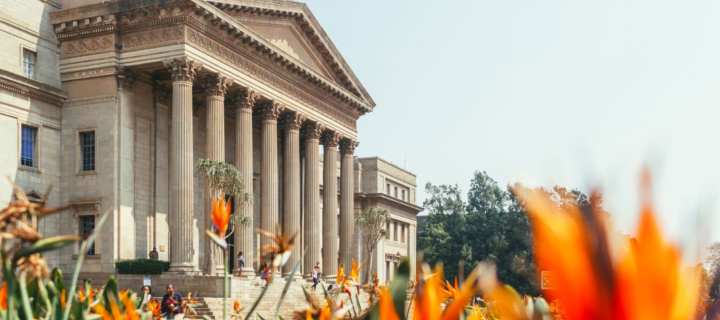Seed funding strengthens ties between Edinburgh and Wits
The seed funding is the first of its kind between the two universities. Find out more about the five successfully awarded joint projects.
Five joint projects between researchers at the University of Edinburgh and the University of Witwatersrand (Wits) in South Africa have recently been awarded seed-funding to support their completion. Funding from the University of Edinburgh comes from the Scottish Funding Council’s Global Challenges Research Fund (GCRF).
This funding initiative, which is the first of its kind between the two universities, will support the development of global research between Edinburgh and Wits with new and existing collaborations, and strengthen partnerships between the two universities in key research areas.
Wits and Edinburgh have a long history of collaboration and the joint seed funding awarded by both institutions will support existing collaborations and also new areas for development. The five projects seek to battle a number of global challenge areas; inequality, the environment, infection and education. The funding allows researchers with excellent and diverse experiences to come together and develop significant research for the future

The projects bring together researchers with a diverse range of expertise including Edinburgh based researchers, Dr Clara Calvert and Dr Jon Henderson. Both are successful recruits in the latest round of the highly prestigious Chancellor’s Fellowship programme, which focuses on innovative research that addresses challenges faced by low and middle income countries.
A round up of the five collaborative research initiatives can be viewed below.
Data collection in the COVID-19 era: a pilot study of self-measurement kits for hypertension risk in Soweto, South Africa: Dr Lisa Ware (Wits), Dr Clara Calvert (UoE)
With evidence suggesting that COVID-19 disproportionately impacts people with hypertension, and with so many undiagnosed hypertension cases in low-middle income countries, the aim of this project is to develop, and pilot test a low-cost kit and simple set of instructions for the assessment of hypertension that can be used by participants themselves within their own homes.
RASSA (Rock Art Scotland and South Africa): Dr Sam Challis (Wits), Dr Jon Henderson (UoE)
This project will co-create an active programme of challenge-led research into how rock art in South Africa can establish tangible social, economic and cultural benefits for low-income and marginalised communities. Amongst a number of objectives, the study intends to address methods of community-led recording of rock art using innovative but low-cost digital approaches and effective ways of archiving digital rock art data in a Global South context.
Learn more about the current research by the School of History, Classics and Archeology
Assessing the relative importance of grass species composition and fire on microbial communities: Dr Sivu Situngu (Wits) and Dr Caroline Lehmann (UoE)
The rhizosphere of African rangelands has had virtually no investigation, and little is known about its sensitivity to environmental change. Over the last three years, researchers at Wits and Edinburgh have been examining the responses of grasslands to fire, grazing and drought. Changing patterns of rainfall and drought are highly likely to influence soil microbial communities and therefore the ecosystem services grasslands provide. This project will seek to quantify relationships between soil microorganism and grass communities where species composition has been manipulated and droughts artificially imposed.
Understanding the human footprint in the world’s largest savanna (SavannaPrint): Prof Wayne Twine (Wits) and Dr Casey Ryan (UoE)
Forest and savanna restoration is touted as a way to improve rural livelihoods and, simultaneously, as a “nature-based solution” to climate change. However, in the southern Africa savannas, the basic concepts of what restoration is, and what the restored state should look like is disputed. This knowledge gap needs resolution to facilitate improved understanding of how to conduct restoration, and how this can be done in a way that enhances local livelihoods. The SavannaPrint project will pump prime research on this topic, by providing a proof of concept that can be used to support a larger Wits-Edinburgh collaboration.
Learn more about the current research by the School of Geosciences
Bilingual Education for deaf children: Panacea or Pandora’s box?: Dr Claudine Storbeck (Wits) and Rachel O’Neill (UoE)
Bilingual Education is often proposed as ‘best practice’ in Deaf Education internationally, combining the country’s signed language and spoken and/or written language. Despite this conceptual clarity and agreement, a shared understanding of pedagogical implementation remains elusive, evidenced in the continued lag in deaf children’s educational outcomes world-wide. This project will begin to explore teachers’ beliefs, perceptions and pedagogical experiences of Bilingual Deaf Education, with a pilot project in three countries with the aim of deconstructing both concept and practice in order to set a foundation in place for potential future projects working in South Africa, Scotland and either Malawi or Tanzania.
Learn more about the current research by Moray House School of Education and Sport
We look forward to sharing the outcomes and impact of all the work carried out, and any opportunities for future collaboration that evolve.
For staff looking for support in developing new partnerships we have a toolkit containing guidance and support
Visit the Partnerships Toolkit

